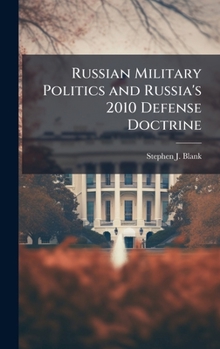Russian Military Politics and Russia's 2010 Defense Doctrine
Select Format
Select Condition 
Book Overview
These three papers represent the third monograph to come out of the SSI-U.S. State Department conference "Contemporary issues in International Security," that took place at the Finnish Embassy in Washington, DC, on January 25-26, 2010. This monograph consists of three deeply probing essays into the genesis of Russia's 2010 defense doctrine, the political struggle behind it, and the actual content of the doctrine. They reveal a highly politicized minefield of struggle comprising leading actors in the military, the government, and in Russian security policy as a whole. They duly illuminate the ongoing struggles between and among these sets of military and civilian elites and therefore cast a shining light on critical aspects of Russian policy that all too often are left in darkness. They are essential to any understanding of Russian defense and security policy as well as the nature of the relationship between the Russian military and the government and the way in which these actors formulate key policy statements and resolve pressing political issues.
This work has been selected by scholars as being culturally important, and is part of the knowledge base of civilization as we know it. This work was reproduced from the original artifact, and remains as true to the original work as possible. Therefore, you will see the original copyright references, library stamps (as most of these works have been housed in our most important libraries around the world), and other notations in the work.
This work is in the public domain in the United States of America, and possibly other nations. Within the United States, you may freely copy and distribute this work, as no entity (individual or corporate) has a copyright on the body of the work.
As a reproduction of a historical artifact, this work may contain missing or blurred pages, poor pictures, errant marks, etc. Scholars believe, and we concur, that this work is important enough to be preserved, reproduced, and made generally available to the public. We appreciate your support of the preservation process, and thank you for being an important part of keeping this knowledge alive and relevant.





